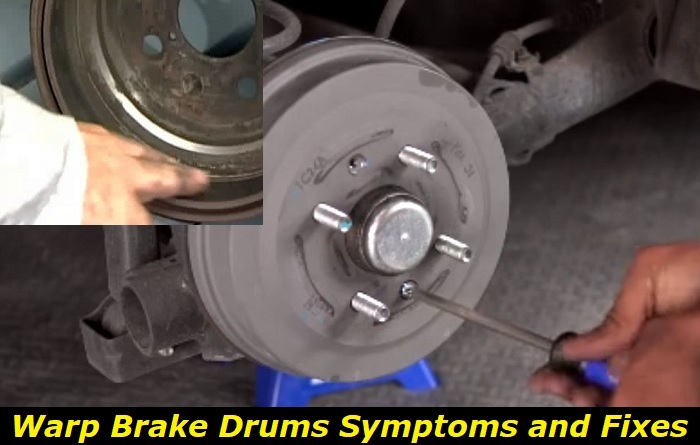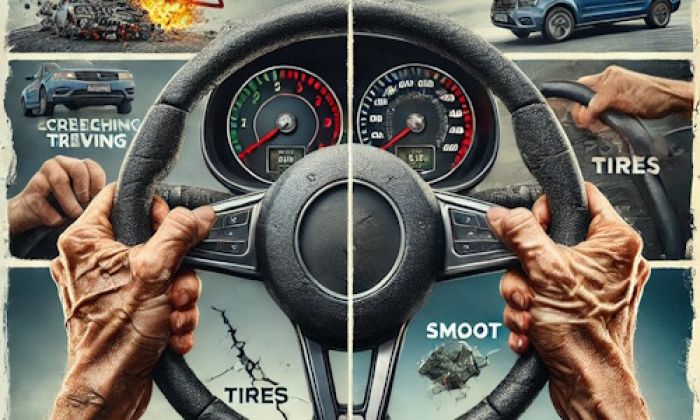Having a dependable braking system can be the difference between life and death when behind the wheel of a moving vehicle. The performance of your braking system needs to be constantly reliable as it will not only save you money but also prevent possible accidents. As your life literally depends on the braking system when driving your vehicle, you should always make sure that it is functioning properly at all times.
Brake pads problems highlights
- Level of urgency:super-urgent
- DIY diagnostics:possible but complicated
- DIY repairs:impossible
- Price for repair:$250 - $450
- Common symptoms:sounds when braking, unintentional braking, warped rotor
- Commonreasons:bad pads, improper installation, old pads
- If ignored:rotor wear, bad brakes, damage to the system

What Are Brake Drums and What Causes Them to Warp?
The brake drum system is known as the grandfather of braking systems and has been around for quite a long time now. Being available in a wide range of sizes and designs, the brake drum system is used in industrial, commercial, and automotive industries. Since patented back in 1902, the brake drum system's simplistic design has worked well and was never modified much from its original concept.
Set up on the rear wheels of many vehicles, the drum brakes use a slightly different tactic than disc brakes in order to slow down the wheel. Unlike disc brakes, which squeeze pads onto the rotor using calipers, drum brakes slow the wheel down by pushing the brake shoes against the inside of a rotating cylinder-shaped brake drum. Both air and hydraulic force can be utilized to accomplish the pressure used to push the brake shoes and create the needed friction.
Since the brake drum system functions by using friction and contact, the brake drums can wear out or get warped. As the shoes get forced against the sides of the drum, it creates excessive amounts of heat and friction. As a result, over time, it is common for the drum to get warped or out of round.
The physical condition and the lifespan of your vehicle's brake drums are greatly affected by your driving style and habits. One of the main causes of warped brake drums is excessive braking and/or rough driving, especially at high speeds. Trying to stop your vehicle forcefully at a high speed creates an inordinate amount of heat/friction and occurring regularly over some time will result in a damaged or warped brake drum.
Symptoms Of Warped Brake Drums
Over time or due to excessive/rough braking, the brake drum will eventually warp into an oval shape and/or wear out. An out-of-shape brake drum will not allow for an ideal clearance between the damaged drum and the shoes. Also, as the shoes will not be able to make contact properly with the unevenly shaped drum, you will experience uncomfortable driving conditions and dangerous issues on the road.
Fortunately, when you are dealing with a warped brake drum, there are some easy signs and symptoms that will alert you that a problem has occurred. By being aware of the common symptoms listed below and using your senses, you will easily be able to detect if/when your brake drums are warped. If your vehicle has a warped brake drum, it should never be neglected, and nor should you continue to drive under such conditions.
- Unusual/Harsh Brake Pedal Feel
Whenever someone presses on the brake, it is expected to get a firm resistance from the brake pedal when the braking system is working properly. However, with a warped brake drum, you will notice an unusual feel when pressing down on the brake pedal. Experiencing a throbbing or vibrating brake pedal is one of the most common symptoms of a brake drum that is warped or damaged.
Depending on the severity of your warped brake drums, you may even feel the vibration on the steering wheel when pressing down on the brake pedal. The throbbing or vibration is more common and usually felt when stepping on your brakes when your vehicle is at a high speed. However, it is possible to also experience the unusual brake pedal feel when there is only a light amount of pressure on the brake pedal if the condition is severe.
- Abnormal Sounds When Brakes Are Pressed
Abnormal sounds coming from the rear brake drums when pressing on the brake are also another very common sign of a warped or damaged brake drum. If your brake drums are damaged, you will be able to hear scraping or scratching noises when you attempt to apply the brakes on your vehicle. Since unusual sounds can also occur from worn-out brake shoes, it is best to do a close inspection when hearing abnormal sounds in order to determine the exact root of the noise.
- Loose parking brake
Experiencing a loose parking brake condition is also a common symptom associated with warped or worn-out drum brakes. Whether due to the uneven surface or the brake rotors being glazed with the brake shoe material, the shoes may not be able to effectively hold their position when pressed against the inside of the drum. As a result, the parking brake can fail to work efficiently and when you engage the parking brake, your vehicle may slip a few inches.
How To Locate and Fix These Issues?
The drum brakes are normally located on the rear wheels of the vehicle, whereas parking brakes are much easier to add to a drum brake than a disc brake. Depending on the condition of the warped brake drums, if the shape is too oval for instance, then it will cause the vehicle to shudder and shake when braking. In that case, you will have no choice but to replace your warped brake drum and probably the brake shoes as well.
If your rotors are warped and a mechanic is able to straighten them, the chances are that once under continuous heat and friction, they will get warped again. The process of turning or resurfacing warped rotors involves turning the steel-made rotors the opposite way to make them flat or scraping down the warped metal in order to recoup a smooth and even surface. Consequently, both of the procedures make the warped rotors thin and very likely to warp again within a shorter time.
Brake drums are usually not very difficult to service and only require a basic set of hand tools along with a drum brake adjustment tool to get you going. Once you have the brake drum that is causing issues removed, you should look for signs of imperfections. Some of the common issues with your brake drums are caused by cracks, discoloration, excess rust, corrosion, or oil on the brake drum or on other surrounding brake parts.
Along with inspecting the brake drum, it is advisable to check the thickness of the brake drum linings or the brake shoes. If the thickness is less than ? inch, then it could be getting too worn out and end up causing a scraping noise when you press on the brake. Although servicing your brake drums will solve most of these minor issues, more serious problems such as warped or severely damaged brake drums will most likely need to be replaced.
Conclusion
The brake drums are a critical component of your vehicle's braking system. Depending on your driving habits and how often you have your braking system serviced, the brake drums can easily get warped. Excessive pressure on your brakes or rough driving can not only speed up their natural wear-and-tear process but also cause your brake drums to warp and become out of round (oval-shaped).
The extreme heat due to excessive braking eventually makes the metallic components more malleable and causes the brake drums in your vehicle to become warped. Thankfully, some common tell-tale signs will let you know when something is not right with your brake drums. Ignoring any issues related to the braking system is simply dangerous for yourself and others on the road.
Therefore, if you suspect that your braking system is not functioning properly, don't waste a moment. Avoid driving under such hazardous circumstances and have your vehicle's braking system inspected by a professional mechanic ASAP. For those drivers who believe that prevention is much better than cure, simply stick to the maintenance schedules recommended by your manufacturer and make sure that your braking system is regularly checked and is in a healthy condition.
About the authors
The CarAraC research team is composed of seasoned auto mechanics and automotive industry professionals, including individuals with advanced degrees and certifications in their field. Our team members boast prestigious credentials, reflecting their extensive knowledge and skills. These qualifications include: IMI: Institute of the Motor Industry, ASE-Certified Master Automobile Technicians; Coventry University, Graduate of MA in Automotive Journalism; Politecnico di Torino, Italy, MS Automotive Engineering; Ss. Cyril and Methodius University in Skopje, Mechanical University in Skopje; TOC Automotive College; DHA Suffa University, Department of Mechanical Engineering






Add comment